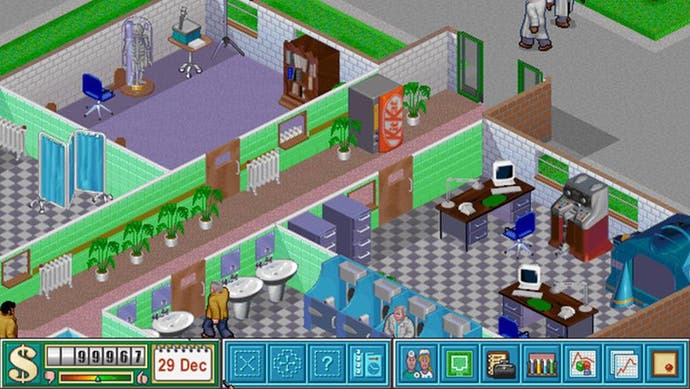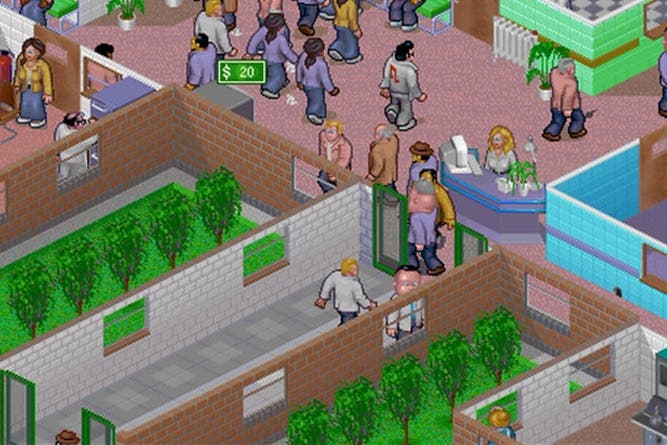20 years on, Theme Hospital is still brilliant
Happy Hunting.
Years ago, holidays belonged to my only true passion. Obviously, I'm talking about healthcare administration. Home from university, my sister and I had a very particular way of playing Theme Hospital. One of us would take the reins - an easy enough level, say Sleepy Hollow or another one of the early stages - and would build out the basic skeleton of a working organisation. We would employ excellent doctors and excellent nurses, and knock up a ward, a staff room, a toilet block. And then? Then we would step away and let the simulation run for a good long while without any more input from us. And when our careful negligence was done, we would hand control over, so that the new player could inherit an embattled shell of a thing: understaffed, underfunded, and utterly under-appreciated. How would they react?
(Obviously, it would be years until my sister and I discovered that Jeremy Hunt had been watching us through a window the whole time and nicking all of our management ideas.)
One of the miraculous things about Theme Hospital, seen from these early weeks of 2018, is how confident it is in navigating the political ramifications of its milieu. For someone who has grown up with the NHS, politics is an inescapable concern here, from the very start of the game's gleeful opening scene, in which a surgeon walks heroically into an operating theatre and readies a chainsaw, before refusing to operate when the patient's credit card is declined.
Even when you ignore the strange landscape of private medical insurance, Theme Hospital can't help but make you think about the real world, because healthcare remains the ultimate political cat-toy, cherished and knocked about by the whims of people who ultimately don't rely on it very much. Theme Hospital is a self-consciously silly game, but it's also one that is intimately concerned with the quality of life as well as its duration. (And as such, it's quite a nice antidote to a handful of today's big budget games that seem to want the sexy veneer of current affairs but aren't willing to alienate any of their potential audience - even the neo-nazis.)
To put it another way, welcome to the hospital that I have spent most of this morning piecing together. It has a vast staff room and a tiny ward - the result of an admin error. It has no fire extinguishers but 25 Kit-Kat machines - the result of a clicking error. Radiators stand out starkly in the middle of hallways as if they are art installations, because I forgot how to rotate them in a way that would allow them to hug the walls. Even so, everybody is freezing. Everybody is freezing and everybody is dying and everybody is doing all this standing up because I have neglected to provide benches.
It is not hard to see why people still love Theme Hospital, Bullfrog's exuberant exploration of death and suffering. It's not only still entirely playable despite being twenty years old: booting it up today actually provides a welcome return to an era where games were so palpably stuffed with the sheer joy of their existence that there were even jokes wedged into the menus. It is still so easy to get swept along with the giddy thrill of it all. Theme Hospital does not feel remotely like an artefact, despite the toytown UI, the fixed perspective and the occasional lack of transparency into why everyone's so upset (nobody will tell you this, but it's often because the rooms you've built are too small). To put it all in the language of healthcare, Theme Hospital is not failing and needs no modernisation.
And it almost needs no tutorial. At the beginning of Theme Hospital you are granted a space in which to set up a reception desk and a waiting area, in which to drop staff and lay out rooms and fill them with equipment. You'll need to be able to diagnose patients and then cure them of their various ailments. Later on, you'll need to research new diseases and new therapies. You know the way it works: new gadgets to build, new rooms to put them in, and all the while there are staff to keep happy, corridors to keep clean, and patients to keep warm and fed and well away from the grim reaper, who pops up every now and then and politely beckons any unfortunates into a lava-filled oubliette.
This is a neat world where every ailment has its own counter, so long as you have put in the money and the effort. Even so, it has lovely emergent moments of mess, when the trash piles up and the overall happiness goes through the floor, or when one puking patient will trigger a tsunami of vomit that sweeps across the entire campus. It's an expansive game: you can tank your economy by buying up too many new buildings, but you can equally find yourself stuck without necessities if you run out of room. It's filled with lovely details, too. Playing a few minutes ago, I saw a handyman walk past a banana peel on the floor and then double back to sweep it up.
On the wards, this is healthcare as you may have imagined it worked as a kid: people are cured of invisibility or have their swollen bloaty heads popped like balloons and then reinflated. But there is a patina of middle-age grumbling, too: a little experience to rub up against all that innocence. The staff you have to pick between hiring often give you no good options to choose from: an unstable doctor or a dangerously incompetent one? Equally, once they're in place they can grow resentful - those small rooms! - and demand pay rises.
Underneath all this, a lovely strategy game clicks and purrs. Theme Hospital kicks off as a spatial challenge - if only I hadn't built such extravagant toilets! - but quickly becomes a job about juggling people and money and the whims of an ailing population. It's the triangle problem announcing itself once again: do things well, do things fast, do things cheaply, but don't think you can do all three. Watching the really good players on Youtube, I have found that a great administrator destroys as much as they build over time, rearranging the layout of rooms as the crush of patients demands it, taking down bottlenecks with a hammer and a chequebook.
What elevates all this, though? There's the unmistakable Englishness of Bullfrog, of course, but I'd also argue that there's the sheer power of the fiction - a power that allows the fiction to do unusual things. Whenever I play Theme Hospital there always comes a point where I get so attached to a hospital I'm working on that I can't bear to move on. And so, when the game tries to kick me into the next level because I have met the necessary requirements in terms of budget, reputation, people saved and all that jazz, I keep batting the job offers away. This is the only strategy game I have ever played where this problem comes up for me. Being a king is fine and all, but I want new challenges after a while. Running a hospital, however? Well, when I'm running a hospital the attachment simply becomes too great.
And here's the thing: I can already imagine people getting angry about any talk of a video game and its politics. I know there are a lot of people who believe art and politics should remain separated - as if there was ever an art form in existence that managed to keep the two from blending.
But the political aspect to Theme Hospital, light and playful and flippant and silly as it is? It's ultimately why the whole thing works so well for me. I don't care much about fighting the Brotherhood of Nod. I don't even care - forgive me! - about the Exalt. But it turns out I care about running a decent hospital. How can I not? This may be a spatial challenge and a finance challenge and yes the old triangle problem again, but it's also more than that. The patients might have idiotic illnesses and failure might mean angel wings or a cartoon scythe, but they're still patients - and that's why you care. It's a huge thing - life and death - and yet seen in this light it is entirely human-sized.

On this front, there are two things that have occured to me as I've been playing Theme Hospital again over the last few days. The first is that, according to Bullfrog's design, institutions frequently become the image of the people who manage them. (Did I mention the radiators thing?) Surely hospitals, not only the virtual ones, can't help but be shaped by the money and thought that goes into them from on high - or more often the money and thought that doesn't go into them from on high? Surely they can't help becoming a portrait - a terribly honest portrait - of the politicians who are at the top of the decision-making tree.
Or can they? Because this is the other thing that occurs to me, and the one thing that Theme Hospital struggles to blend into its simulation. In this country, the health service is kept afloat by its staff, staff who will often go so far above and beyond the call of duty that they can sometimes make even the direst of situations look relatively breezy from a patient's perspective. Budget-cutting is frequently such a cynical business because those cutting the budgets know that there are doctors and nurses and thousands of other staff-members who will simply work harder to cover the gap as best they can.
As I type this I can hear Theme Hospital running in the other room, a light-hearted game with some surprising depths. It's still grinding out the simulation, still talking to itself. I hear a voice announcing that a doctor is required in general diagnosis. I hear the rattle of door handles. I hear apologies for the amount of litter. I hear applause as someone is cured. I should move on, really: a bigger hospital, a bigger budget, a brand new selection of illnesses and other challenges. But this place has got to me. I don't want to leave. Not until people start using those Kit-Kat machines, anyway.



